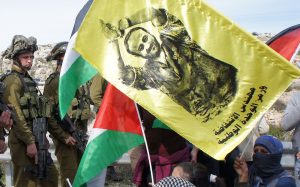
 Israel Prison Service negotiated an end to the prisoners’ hunger strike with the Palestinian Authority, without meeting a single one of Marwan Barghouti’s demands. The initiator of the strike, Barghouti, was caught on hidden surveillance camera eating candy bars in his bathroom during the hunger strike.
Israel Prison Service negotiated an end to the prisoners’ hunger strike with the Palestinian Authority, without meeting a single one of Marwan Barghouti’s demands. The initiator of the strike, Barghouti, was caught on hidden surveillance camera eating candy bars in his bathroom during the hunger strike.
By Elior Levy
New details concerning the conclusion of the Palestinian prisoners’ hunger strike and its causes are coming to light in the hours since the prisoners and the Israel Prison Service (IPS) made their announcements.
As the strike reached its peak, with dozens of prisoners requiring medical attention, Palestinian Authority President Mahmoud Abbas intervened directly in order to bring the matter to a close out of fear of significant provocations and demonstrations.
The beginning of the Muslim holy month of Ramadan was a significant motivator, given that prisoners would no longer be able to drink, which they had been doing prior to the holiday.
Since the beginning of the strike, Minister of Public Security Gilad Erdan decided that dialogue with the prisoners would only be conducted through the IPS, which is subordinate to his ministry. This policy differs from previous incidents when prisoners also negotiated with the Shin Bet and Egyptian intelligence services.
Ynet has learned that Abbas was pressured by various Palestinian officials to bring about a change in the situation, finally agreeing for the PA to finance the cost of one of the two visits per month prisoners are entitled to with their families.
The cost is estimated to be between $6-7 million per year and was previously financed by the Red Cross, which cut the program following budgetary constraints.
Israel, it should be noted, had no objection to this move because international law requires it to allow two visits per month to prisoners.
However, Israel objected to the notion of financing travel costs for family visits from the West Bank and the Gaza Strip due to security reasons.
The news of the PA agreeing to finance the second visit was passed to Israeli security officials by Palestinian Civil Affairs Minister Hussein al-Sheikh. In turn, IPS officials sat with leaders of the strike, including Nassir Abu Hamid and Ahmad Barghouti, to inform them of the PA’s gesture.
Following the revelation, prisoners requested a meeting to be held at Shikma Prison in Ashkelon, which IPS officials agreed to. The meeting lasted from Friday afternoon to early Saturday morning, with prisoners requesting to speak directly with PA officials including al-Sheikh.
Several senior officials involved in the strike told Ynet that the IPS also promised striking prisoners that additional sentences imposed upon them as a result of their strike would be cancelled.
IPS officials were pleased the strike was halted and the promise of no additional punishment as a result of the strike, as well as guaranteed two visits per month to families, gives Palestinian prisoners something to show for the effort.
However, it should be noted that none of the demands put forth by Marwan Barghouti—including access to phones—were met.
In total, some 6,200 Palestinian security prisoners are currently incarcerated in Israel. According to the IPS, some 1,200 prisoners joined the strike at its peak, with only roughly 830 remaining by Friday evening.
(Translated and edited by Fred Goldberg)
View original Ynet publication at:
http://www.ynetnews.com/articles/0,7340,L-4968001,00.html







 Israeli New Shekel Exchange Rate
Israeli New Shekel Exchange Rate